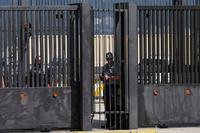An advocacy group for part-time troops launched a new tool Friday aiming to measure what it means to be a military-friendly employer as companies like to tout their support of service members with few metrics to back up those claims.
Guardsmen and reserve troops often have to balance full-time civilian jobs with having to take time off work to perform their military duties. The National Guard especially has been tasked frequently in recent years with both overseas obligations and serving on state missions. That state service has become a go-to for governors who have faced labor shortages since the beginning of the pandemic.
Friendly Forces, an advocacy group, aims to give part-timers a tool to gauge which employers might be more supportive of their service and offer companies an opportunity to show off their backing for the rank and file.
Read Next: Austin Orders Renaming of Bases that Honor Confederate Rebels
The most important benefit employers can offer? Paid military leave.
"I need actionable things that [help] me as a serving reservist," Eric Evans, an Army Reserve captain and CEO of Friendly Forces, told Military.com. "Just saying you love veterans and troops doesn't really help me if you don't have a policy that supports them getting called up for a domestic emergency or deployment or anything like that, because you can talk all day about loving veterans, but it really comes down to, are your policies truly supporting them or not?"
The Guard played a huge role in the post-9/11 wars, serving as one of the key components of U.S. combat power overseas at any given time. Roughly 14% of troops killed in combat since the invasions of Afghanistan and Iraq were Guardsmen or troops from reserve components, according to data from the Congressional Research Service.
There is a seemingly endless roster of employers that want to be viewed as friendly for veterans and service members.
But it can be difficult to objectively define how military friendly a company really is. Some undefined lists of supposedly friendly companies are found on blogs with anecdotes about how many veterans a business hires. Others are built by states. Ohio, for example, has a list of 7,409 so-called "military friendly" employers. Anyone doing business in the state can self-select themselves as military friendly, according to the site.
The law does not require employers to pay service members when they're on duty. Generally, employers simply cannot terminate someone for leaving for military duty or otherwise disadvantage them, according to the Uniformed Services Employment and Reemployment Rights Act. Civilian bosses also cannot force service members to use regular paid time off while serving, though troops sometimes elect to do so.
But those laws protect only troops on federal orders. For reserve troops across all the services, this is not an issue. But Guardsmen are often deployed on state duty for natural disaster responses or riots, among other missions. Until the president declares a national emergency federalizing the Guard, such as during the response to the insurrection at the U.S. Capitol, they aren't covered by federal law.
Some states have their own laws against discriminating against Guardsmen, but it's far from ubiquitous and proving discrimination in court can be challenging.
Friendly Forces crafted a list of nearly 200 employers and plans to keep adding more, ranking them largely based on their military leave policies. USAA, an insurance company for service members and their families, has a generous policy of 12 months of full paid military leave, while Southwest Airlines has no clear policy on the matter, according to the data. But the most common policies grant troops roughly two weeks of paid leave, about the average length of an annual training event, or differential pay, in which employers make up the difference between the military paycheck and what the service member makes at their civilian job.
For major corporations that might not feel the paid military leave on their bottom line, it can be an easy win to be perceived as supporting the troops.
"It's good PR and sends a message to other employees that they are taking care of service members," John Goheen, director of communications for the National Guard Association, told Military.com.
Part-time troops often take pay cuts during their service. In most cases, they are expected to serve one weekend a month -- though in many cases that weekend duty can stretch into the weekdays -- and also an annual two-to-three-week training period, often in the summer.
Some argue that the bang for buck is in the employers' favor, given troops come to the job with unique skills and in some cases can be cheaper employees since they may already have health care through the military.
"The Guard and reserves cannot function, unless we are supported at home by our employers, and our military cannot function without the Guard and Reserve," Evans said. "So it's a national security issue."
-- Steve Beynon can be reached at Steve.Beynon@military.com. Follow him on Twitter @StevenBeynon.
Related: The National Guard Is Having a Nightmarish Time Keeping Soldiers and Recruiting New Ones












